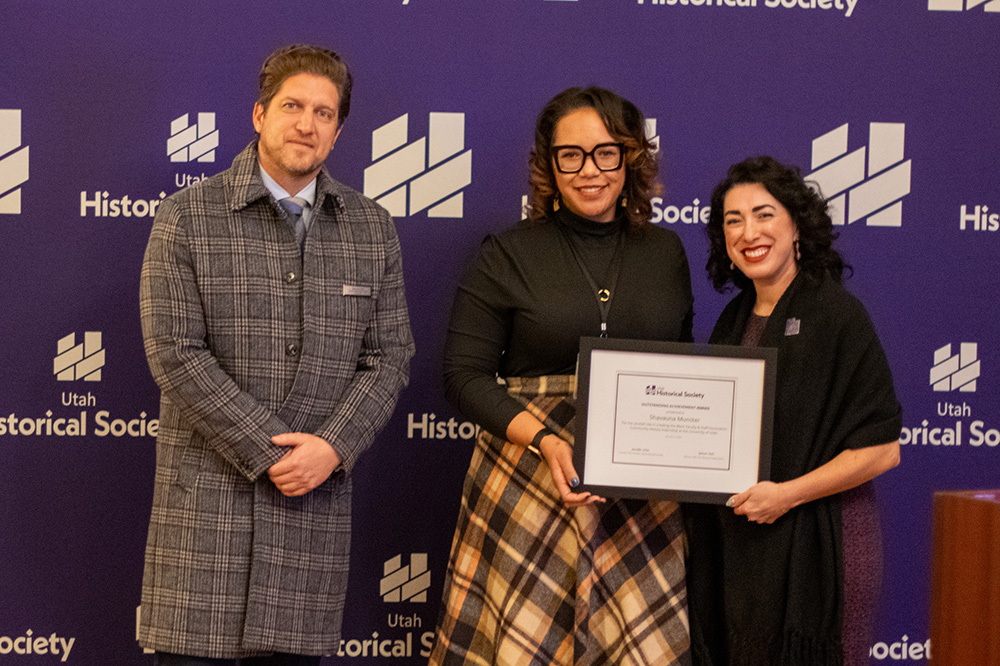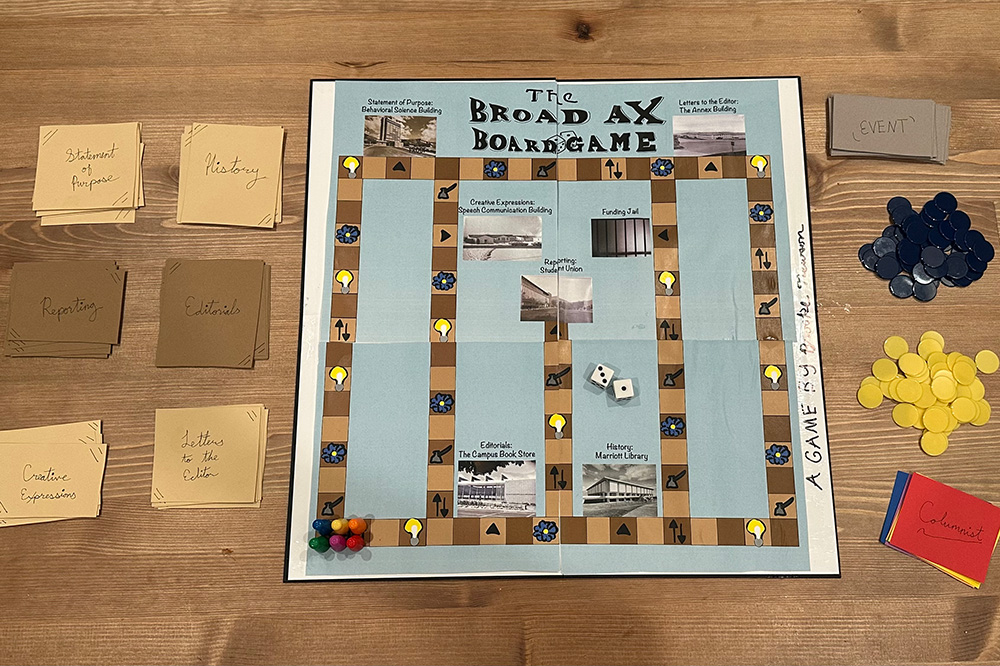Shavauna Munster Recognized with Outstanding Achievement Award from Utah Historical Society

Jennifer Ortiz (Director) and Spencer Hall (Board Chair) of the Utah Historical Society, present Shavauna Munster with the Outstanding Achievement Award.
On January 13th, Shavauna Munster was recognized with the Utah Historical Society’s Outstanding Achievement Award for developing a unique student opportunity: the Black Faculty and Staff Association (BFSA) Community History Internship. Munster is the Academic Coordinator in the Department of History, as well as a U humanities alumna – she graduated in 2015 with a B.A. in History and Creative Writing and in 2020 with an M.A. in Medieval History.
The BFSA Community History Internship, now in its 6th semester, has roots in Munster’s own commitment to the university community. While serving as the BFSA Historian, Munster was conducting research on the history and contributions of Black faculty and staff at the U and looking through the University Archives. Realizing that the scope of the project far outstripped what a single researcher could do, Munster created the internship as an opportunity for undergraduate students who were interested in community history to participate and gain valuable archival experience themselves.
Callie Avondet, the first student to participate as a BFSA Community History intern, is now a doctoral student in the College of Education at the University of Illinois Urbana-Champaign. Reflecting on her experience as an intern, she says, “Some of the things that stuck with me most are both how understudied Black faculty are historically, and as I’ve continued working on projects from that internship, just how little research has been done comparatively about Black history in Utah overall.”
As the internship evolved over the years, Munster has worked closely with librarians Rachel Ernst and Allyson Mower, as well as associate professor Matt Basso (History) to refine the experience for students. Says Basso, “Internships provide a remarkable opportunity for students to get real world experience applying historical skills. What’s particularly exciting about the opportunity Shavauna has created is the intensive mentoring she’s able to provide and the deep commitment that students build for the work that she has facilitated.
In its current iteration, students are carefully shepherded through an immersive archival research experience during the first semester, during which they develop an original research project and present it in a format of their choosing. In an optional second semester, students have the opportunity to write an article based on their research and submit it for consideration to Utah Historical Quarterly. UHQ staff work closely with Munster and the BFSA Community History interns, providing mentorship through the scholarly writing and publication processes. Holly George, editor of the journal, praises Munster’s work, saying “Shavauna Munster is a delight to know and to work with. It is honestly refreshing to spend time with her. For the past year, I’ve had the opportunity to watch Shavauna mentor interns as they research the history of African Americans at the University of Utah. It’s obvious that she genuinely enjoys both helping these students learn and achieve and extending our knowledge about Utah’s Black history.”
Allyson Mower, Scholarly Communication & Copyright Librarian at the J. Willard Marriott Library who nominated Munster for the award, has been impressed by the way this internship has opened doors for students. “I nominated Shavauna for this award because her idea represented both innovativeness and impact,” says Mower. “She saw that Black history in Utah needed to be told in an in-depth way and what better way to ensure that than through consistent, on-going scholarship. It was such a fantastic idea. The students’ experiences and the new works of authorship they have all created have been truly remarkable.”

The Broad Ax board game, which Newson developed as part of her internship project.
Brooke Newson, a senior who is currently participating in the year-long internship with a study about the 1970s revival of a Black community-centric newspaper called the Broad Ax, reflects on the relevance of her experience as an intern. “It’s been extremely helpful in terms of getting experience I’ll need when I’m moving on after school,” she says. “The job market is kind of discouraging right now, but this makes me feel more confident about being able to find my next step and really say ‘I have valuable archival experience in addition to my education.’ I’ve also learned tons of valuable skills in terms of argumentation, synthesizing information, how best to convey information to an audience…I’m really grateful that Shavauna made this happen on campus.”
Munster, for her part, is most proud of the original work that the undergraduate researchers create; students have gone on to publish their findings in Utah Historical Quarterly as well as produce unique final projects like a board game about the Broad Ax (the Black student newspaper). She was initially surprised at the volume of interest generated by the internship; saying, “I was so floored by how many people were interested and wanted to participate."
The most rewarding part of supervising internship students? Coaching them through a real research process for the first time. “It makes me feel good that I can help the student when they’re halfway through the semester and are completely overwhelmed. I can let them know that it’s okay – this is a great place to be, there are so many possibilities,” she says. “And then at the end of the semester they look back and realize, ‘Oh, I was so scared about it, but I didn’t need to be!’ It gives them so much confidence in themselves to keep on going.”
Avondet echoes the confidence-building effect of the internship, remarking that she would encourage undergrads to “Absolutely go for it! It’s truly taught me skills that are hard, if not impossible, to teach in a regular undergrad course. And because you have that one-on-one mentorship, it was invaluable in both understanding the history and gaining the skills I wanted to learn. The work feels genuinely important.”
The College of Humanities congratulates Munster on this well-deserved recognition of her work in creating truly impactful student experiences at the University of Utah!
